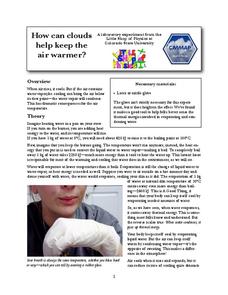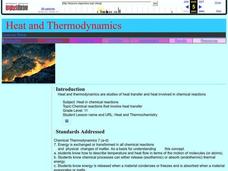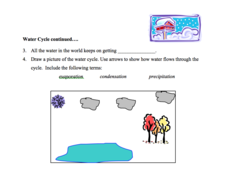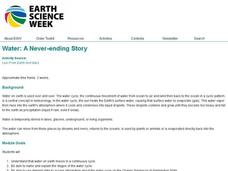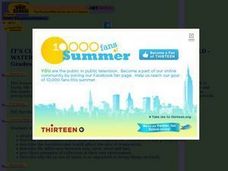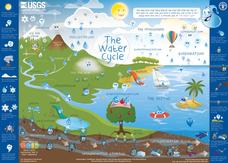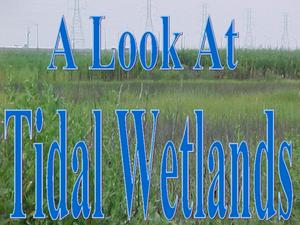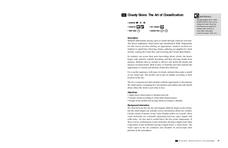Illinois Department of Natural Resources
Section Two: Why is Biodiversity Important?
Explore soil, genetic traits, natural resources, and pollution in a series of lessons that focus on biodiversity. Kids complete experiments to learn more about the importance of varied genes and organisms in an ecosystem.
Curated OER
I Just Drank George Washington's Water!
Guide your learners through the water cycle with this lesson plan. Over the course of the instructional activity, they read two Magic School Bus books, discuss the water cycle, come up with water facts, complete a diagram of the water...
Curated OER
The Properties of Water: "Dead Or Alive"
Students study the water cycle and create a booklet entitled: "Discover the Wonder of Water" They observe and record data regarding evaporation, condensation, and precipitation and how water moves from a solid to a liquid to a gas. They...
Curated OER
Call Me Bond, Hydrogen Bond
As amazing as James Bond is, the surface tension of water does not allow him to walk on it! In this series of little lab activities, physical scientists play with the properties of water due to the hydrogen bonds and resulting polarity....
Curated OER
Water Cycling in the Wilderness: Alaska quarter reverse
The Alaskan wilderness contains every imaginable element of the water cycle: it has flowing streams, cool spring rain, and frozen glaciers. Pupils use a series of worksheets to identify and define evaporation, condensation, and...
Curated OER
Physical Changes and States of Matter
Fourth graders identify a physical change as one that results in a change in size, shape, or state of matter. After an initial teacher-led discussion and demonstration, groups of students get together to perform an experiment which...
Colorado State University
How Can Clouds Keep the Air Warmer?
Condensing water warms the air around it. Young scholars consider this concept as they experiment with air temperature around evaporating and condensing water vapor. They simulate the formation of clouds to experience the associated...
Curated OER
Heat and Thermodynamics
This is actually a 10-day mini unit on thermal energy for your high school chemists. Every avenue is taken to get learners absorbed in heat: a pretest, a PowerPoint presentation, Internet exploration, demonstrations, lab activities, and...
Curated OER
Sweat Your Socks Off
Fourth graders explore evaporation by conducting an experiment. In this water properties lesson, 4th graders examine the differences between two socks that get wet, one which is placed in front of a fan. Students discuss why the sock...
Curated OER
Water, Water Everywhere!
Learners brainstorm on ways they use water, and where water comes from. They view video, Down the Drain, to gain specific facts about water use, properties of water, problems of water and the water cycle. They perform a lab activity...
Curated OER
Water: A Neverending Story
Students investigate the water cycle. In this water cycle science lesson, students participate in a series of activities that demonstrate evaporation, precipitation, and condensation. Students describe their observations using water...
Curated OER
It's Clean, Fresh and only Three Billion Years Old - Water!
Students engage in a lesson which explores the wate cycle. They get to see some very entertaining video, do fun hands-on activities and gain a better understanding of evaporation, condensation, precipitation and collection.
Signing Time Foundation
What is the Water Cycle?
Dive into an exploration of the water cycle cycle with this simple earth science lesson. After first discussing where rain comes from, young scientists define the terms condensation, evaporation, transpiration, and precipitation as a...
US Geological Survey
Water Cycle Poster
How many parts make up the water cycle? How many things on Earth rely on water as a system? Learn more about the water cycle in an informative and colorful poster. Print and hang, or project the graphic in the classroom for optimal use.
Aquarium of the Pacific
States of Matter: Making Ice Cream
Who knew that learning about the states of matter could taste so sweet? This fun hands-on instructional activity captures the attention of learners as they use what they know about solids, liquids, and gases to create their very own...
San Francisco Public Utilities Commission
What is Drought? No Rain, No Water
How can climate change affect our water supply? Have kids read a passage about the water cycle and water conservation, which includes six questions that challenge them to use context clues.
Curated OER
Physical Changes and States of Matter
Fourth graders study evaporation and condensation as parts of the water cycle. First they determine the similarities and differences between a cup of water and an ice cube before measuring the volume of ice before melting it, and...
Curated OER
It Matters
Students use descriptive vocabulary to discuss the attributes of matter. Then, they sort objects or pictures by the type of matter they are comprised of. Finally, students match objects of matter with similar attributes and create a...
Curated OER
Clouds and What They Mean
An excellent resource on cloud types and descriptions could be a valuable addition to your science lesson. After kids learn the correct vocabulary to describe clouds, they complete several worksheets and thermometer activities before...
Curated OER
Chalkboard Challenge
Here's a terrific Jeopardy-style game that's designed for 3rd and 4th grade students of science. The topics include living things, animals, plants, matter, and "hodge-podge." The questions are all age appropriate, and there is an...
Curated OER
A Look at Tidal Wetlands
Here is a comprehensive and lengthy presentation on tidal wetlands. Many photos of grasses and the animals that live among them are included, making this a virtual field trip. The progression of the presentation is as if you would walk...
Bekshire Museum
Cloudy Skies: The Art of Classification
Such a great resource and perfect for learners in Kindergarten through third grade. The class will discuss cloud types and formation, and then they'll get outside and draw as they observe the clouds they see. They'll need to take note of...
Curated OER
WATER HERE AND THERE
Introduce the topic of water conservation with a little drama. Dressed as snowflakes, hail stones, or rain drops class members dramatize the events in a narration of the water cycle. The series of lessons that follow focus on...








